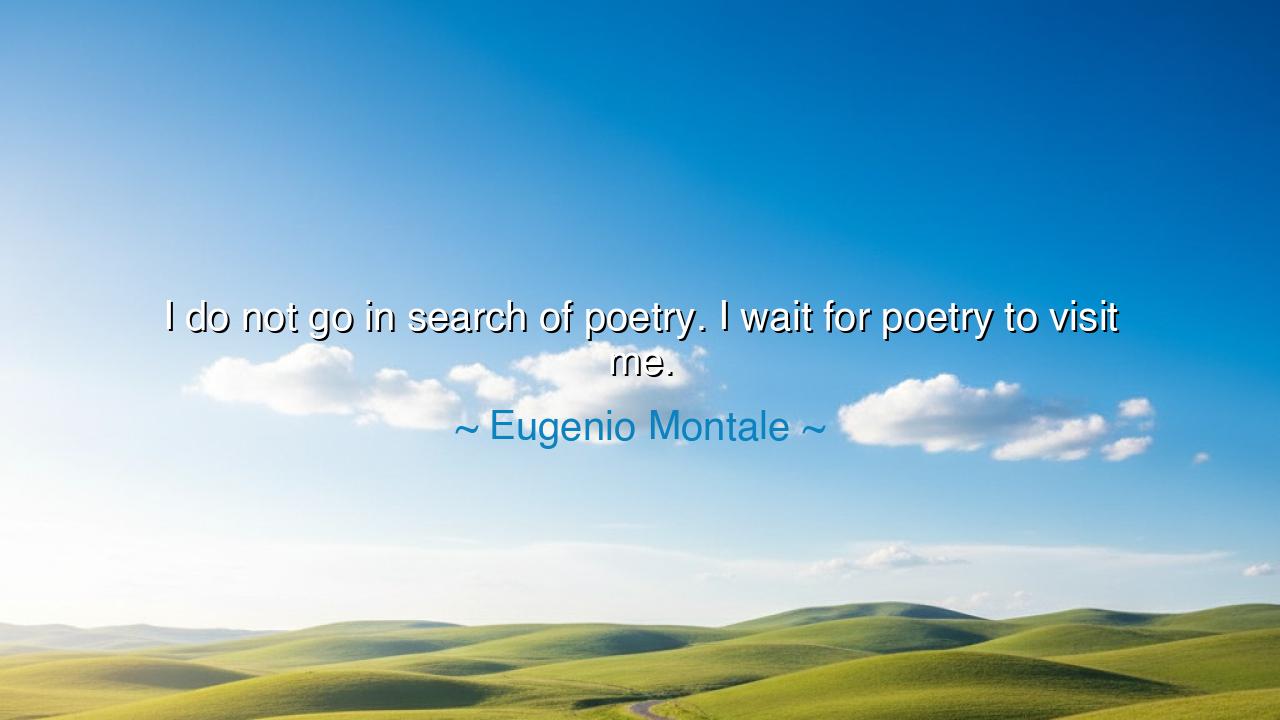
I do not go in search of poetry. I wait for poetry to visit me.






Hear the words of Eugenio Montale, whose voice rose from the silence of war and despair: “I do not go in search of poetry. I wait for poetry to visit me.” In this confession lies the humility of a true poet. Montale does not present himself as a hunter chasing words, nor as a craftsman hammering verses into being by sheer will. Instead, he is a vessel, open and waiting, knowing that poetry comes as a gift, an unexpected guest who knocks at the heart’s door. For him, inspiration is not conquered but received.
The ancients understood this truth. Did not Homer begin with the invocation: “Sing, O Muse…”? The poet did not claim mastery; he called upon the divine voice to enter him. The Hebrews declared their psalms were not their own, but the breath of God moving through them. Even Socrates, though no poet, spoke of a daimonion, a guiding spirit whispering from beyond. Montale echoes this ancient faith: poetry is not manufactured—it descends, like rain, upon the waiting earth.
Consider the life of Montale himself. He lived through fascism, war, and censorship in Italy. He was not a poet of endless production, pouring out verse at command. He was a poet of silence and waiting. His words often emerged from sudden flashes—moments when the ordinary cracked open to reveal eternity: a seashore, a stone, a fleeting gesture. These were not pursued but endured, not seized but welcomed. His practice was patience, his art an act of receptivity.
History offers another example in the figure of Emily Dickinson. She lived in seclusion, not chasing fame, not seeking subjects. Yet in her solitude, poetry visited her again and again, like a bird at her window. She wrote as the spirit moved her, often quickly, on scraps of paper. She too bore witness to Montale’s truth: that inspiration is a visitation, not a quarry. She did not go in search of poetry—she let poetry come.
But Montale’s words are not only about art—they are about life itself. Too often we chase meaning, love, beauty, as if by pursuit we can conquer them. But the greatest things cannot be hunted; they must be welcomed. The sunrise cannot be forced, only awaited. Friendship cannot be manufactured, only received. So it is with poetry: it comes when the heart is ready, when silence has been kept, when the soul is open. The poet is not master, but servant of the gift.
The lesson is plain: learn to wait. Do not force beauty, do not hurry inspiration. Cultivate patience and openness, and when the moment comes, receive it with gratitude. If you write, carry a notebook or the memory of words, ready to welcome the sudden guest. If you live, attend to the small and ordinary, for often poetry comes in the unnoticed moment: a child’s laugh, a leaf falling, a silence that reveals itself.
Practical actions follow. Spend time each day in quietness, away from noise, so that inspiration may find you. Observe the world with reverence, not rushing past the ordinary. Read deeply, so that the mind is fertile when the spark arrives. And when it comes, write without fear, as one recording a gift rather than producing a performance. In this way, you honor Montale’s wisdom: you wait, and when poetry visits, you welcome it.
Thus Montale speaks with the gravity of a sage: do not chase poetry, for it flees from those who grasp too tightly. Instead, be still, be patient, be open—and it will come to you. For true inspiration is not a possession, but a visitation, a mystery that enters only those who make themselves ready. Let us then live as he lived: not as hunters of words, but as hosts of the eternal guest.






GHtran gia hung
Montale’s statement intrigues me because it contrasts sharply with the modern idea of art as hard work. He implies that poetry is a gift, not a goal. But what happens when the visit doesn’t come—when silence stretches for years? Is he suggesting that one must trust the process and not force creation? Maybe true poetry demands surrender: the willingness to let inspiration arrive on its own mysterious, unpredictable terms.
TTLe Thuy Trang
I love how Montale personifies poetry here—as if it’s a guest who must be welcomed rather than hunted. It reminds me that creativity can’t be commanded; it’s an act of receptivity. But I also think that waiting requires its own kind of effort: you have to be ready, alert, open to the world. Maybe Montale isn’t passive at all—perhaps he’s describing a quiet discipline, the art of listening for when inspiration knocks.
TTThuy Trang
This idea resonates deeply with me because it portrays poetry almost as a living presence, something that chooses when to appear. It’s a comforting thought for anyone who struggles with creative droughts. Still, I wonder if Montale’s approach is possible in today’s world, where deadlines and productivity often dominate artistic life. Can poetry still be patient in an impatient age, or do poets now have to chase what once came naturally?
BNPhan The Bao Nam
Montale’s sentiment feels so humble yet mystical. It suggests that poetry is not something we create by force, but something that arrives unexpectedly, like grace. I find that beautiful, but it also raises a question—does waiting for inspiration risk passivity? Many writers talk about discipline and routine as essential to art. Maybe Montale means that poetry, in its truest form, can’t be manufactured—it must emerge from moments of genuine clarity or emotion.